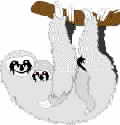The SLOTH Guide to . . . inserting a comma before a coordinating conjunction joining independent clauses.

Return to The SLOTH Guide to COMMAS
|
The SLOTH Guide to . . . inserting a comma before a coordinating conjunction joining independent clauses.
|
|
Return to The SLOTH Guide to COMMAS
|
|
An independent clause is a word group that can stand independently as its own sentence. When two or more independent clauses are joined by one of the coordinating conjunctions, a comma must precede that coordinating conjunction. This is because coordinating conjunctions alone--also known as FANBOYS (for, and, nor, but, or, yet, & so)--are not strong enough to hold together two or more independent clauses, and the absence of the comma could make the complete sentence confusing. (Note that a comma just preceded "and" in that rather long, crammed sentence.) Compare these two versions for clarity:
Note how the second sentence is more clear and has more impact because readers can tell where one independent clause ends and where the next one begins. Also think about why the first sentence's lack of a comma with "but" could make its imagery and meaning somewhat misleading.
|
|
COMMA TIP: insert an imaginary period One of the easiest ways to test whether or not a clause is independent or dependent is to insert an imaginary period at the end of each clause surrounding the coordinating conjunction. If you can imagine a period at the end of a clause, that means it is independent because it could stand alone as a sentence:
Because the two divided clauses before and after "but" can stand alone as sentences, a comma will be needed to help "but" carry load.
|
|
Do not use a comma . . . If either one of the parts cannot stand alone (i.e., if you cannot imagine a period), then do not use a comma with FANBOYS: Hilda knew that Ezra's dog was hungry and would howl all night until fed. No comma is needed before "and" because the word group after it ("would howl all night until fed") is a dependent clause and, therefore, cannot stand on its own as a complete sentence. In other words, the coordinating conjunction will not need the comma's help to carry the load since it divides only an independent clause and a dependent clause, not two independent clauses. |
|
More Comma with FANBOYS On-line Resources |